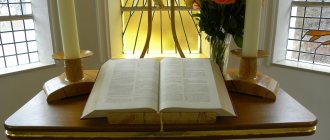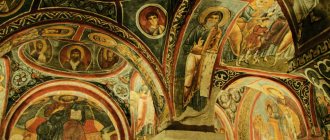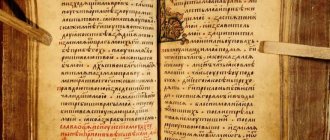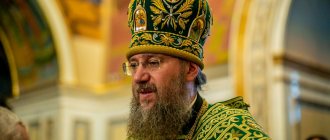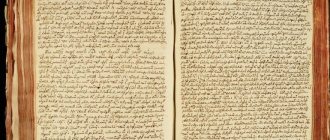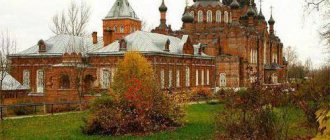The Lord has provided man with many different ways of communicating with him, including prayer. In it, believers usually ask God for help and protection, as well as consolation in difficult life moments. Psalm 5 is one of the most powerful psalms expressing such a request; it is indispensable for any Orthodox Christian who gives up in the face of accumulated problems.
This is the voice that you cannot do without when you cannot turn to God in your own words. This work, included in the Psalter, is a morning prayer in which King David reflects on the attitude of the Almighty towards the righteous and those who do not live according to the laws of God.
History of writing
To understand this issue, you need to carefully study all the details of the fifth psalm. It begins with “To the Chief of the Choir”; next to it there is also an inscription indicating to the accompaniment of which instruments the kathisma should be performed. It was sung, as you know, with wind instruments.
The word “mictam” also appears in the work, which is interpreted differently by different experts. Many assume that this means “covering,” that is, the psalm itself should be considered a “prayer of atonement.”
Like many other inspired texts, this one was written by David in difficult moments of his life. As we know, the king rarely felt at ease, since from a young age until old age he regularly faced attacks from enemies, persecution, and betrayal by those who were supposed to be his supporters.
Among the latter is the prophet’s heir, Absalal, who prepared an uprising against his father. This act hurt the son of David painfully; his heart was torn with anger and inability to come to terms with injustice.
In Psalm 5, the king turns to the Most High, promising him that he will always cry to heaven. At the same time, the author emphasizes:
- he is confident that his words will be heard by God;
- he acknowledges the glory and holiness of the Lord;
- he seeks the answer in worship.
David hopes that the Savior will protect him from enemy attacks and help the people of Israel.
The song of lament was composed just at the time when Absal was actively preparing an uprising against David. That is, the king worked on it even before his forced flight. This can be judged by carefully studying all the emotions that the author expressed in his work. He declares the lawlessness committed by his enemies, the spread of lies, flattering promises, which many blindly believe, agreeing to stage a violent coup that will not happen without bloodshed.
At the same time, David prays and asks God not only for punishment for those who have stepped on the “crooked path,” but also for correction of his own path. Each line in the kathisma indicates that it was written during the birth of the uprising under the leadership of Absalom. Already at the very beginning, the king, not yet leaving the temple, saw the connection between the beginning unrest among the people and his sin, and saw by what means his son was trying to get rid of it.
The fifth psalm is not just a petition, but a painful cry that David emits, realizing that he is in great danger.
Psalter. Kathisma 5
KATHISMA FIFTH.
Psalm 32.
Psalm to David, not inscribed among the Jews.
1 Rejoice in the Lord, O righteous ones; praise is due to the upright. 2 Confess to the Lord with the harp, and sing to Him with a ten-stringed psalter. 3 Sing a new song to Him, sing well to Him, shouting: 4 For the word of the Lord is right, and all His works are in faith. 5 The Lord loves alms and justice; the earth is filled with the mercies of the Lord. 6 By the word of the Lord the heavens were established, and by the spirit of his mouth was all their power. 7 Gather up like a skin of the water of the sea, and put it in the treasures of the deep. 8 Let all the earth fear the Lord; let all who live throughout the world walk away from Unworthiness. 9 For He spoke, and He commanded, and He was created. 10 The Lord destroys the councils of nations, and sweeps away the thoughts of men, and sweeps aside the counsels of princes. 11 But the counsel of the Lord endures forever, the thoughts of His heart to generation and generation. 12 Blessed is the tongue, for the Lord his God is the people whom he has chosen for his inheritance. 13 The Lord looked down from heaven and saw all the sons of men. 14 From His prepared habitation He has looked upon all who dwell on the earth. 15 He who formed their hearts in one mind, was mindful of all their works. 16 A king cannot be saved by the abundance of his strength, and a giant cannot be saved by the abundance of his strength. 17 A horse lies for salvation, but in the abundance of its strength it cannot be saved. 18 Behold the eyes of the Lord are upon those who fear Him, who trust in His mercy. 19 Deliver their souls from death, and feed them into famine. 20 But our soul longs for the Lord, for He is our Helper and Protector. 21 For in Him our hearts rejoice, and in His holy name we trust. 22 O Lord, Thy mercy be upon us, as we trust in Thee.
Psalm 33.
1 Psalm To David, ever change your face before Abimelech, and let him go, and depart.
2 I will bless the Lord always; I will put His praise in my mouth. 3 My soul shall glory in the Lord, that the meek may hear and be glad. 4 Magnify the Lord with me, and let us exalt His name together. 5 Seek the Lord and hear me, and deliver me from all my troubles. 6 Come to Him and be enlightened, and your faces will not be ashamed. 7 This poor man cried, and the Lord heard him, and saved him from all his troubles. 8 The Angel of the Lord will encamp around those who fear Him, and will deliver them. 9 Taste and see that the Lord is good; Blessed is the man who trusts in Nan. 10 Fear the Lord, all you saints, for those who fear Him will have no hardship. 11 For riches they become poor and hungry, but those who seek the Lord will not lack any good. 12 Come, children, listen to me, I will teach you the fear of the Lord. 13 Who is the man who loves the days and sees good things? 14 Keep your tongue from evil, and keep your lips from uttering flattery. 15 Avoid evil and do good. Seek peace and get married. 16 The eyes of the Lord are upon the righteous, and His ears are upon their prayer. 17 But the Lord has the face of those who do evil, even to consume their remembrance from the earth. 18 They cried out for righteousness, and the Lord heard them, and delivered them from all their troubles. 19 The Lord is near to the brokenhearted, and will save the humble in spirit. 20 Many are the tribulations of the righteous, and the Lord will deliver them from all of them. 21 The Lord guards all their bones, not one of them will be broken. 22 The death of sinners is cruel, and those who hate the righteous will sin. 23 The Lord will redeem the souls of His servant, and all who trust in Him will not sin.
Glory:
Psalm 34.
Psalm to David.
1 Judge, O Lord, those who offend me, overcome those who fight against me. 2 Take the weapon and the shield, and rise up to help me. 3 Take away the sword and imprison those who persecute me. The words of my soul: I am your salvation. 4 Let those who seek my life be ashamed and put to shame; let those who think evil against me turn back and be ashamed. 5 Let them be like dust before the wind, and the angel of the Lord insulting them. 6 Let their way be dark and creeping, and the Angel of the Lord shall chase them: 7 For I hid the destruction of my net in vain, reproaching my soul in vain. 8 Let a net come to him that is unknown, and a trap that is hidden, embrace him, and let him fall into the net. 9 My soul will rejoice in the Lord, it will rejoice in His salvation. 10 All my bones cry: Lord, Lord, who is like You? Deliver the poor from the hand of those who strong him, and the poor and the wretched from those who plunder him. 11 I stood up as a witness of unrighteousness, even though I knew not, and questioned me. 12 The evil one rewarded me with a good cart, and my soul was desolate. 13 But when I felt cold, I put on sackcloth and humbled my soul with fasting, and my prayer returned to my bosom. 14 As we have pleased our neighbor, as we have pleased our brother, as weeping and lamenting, we have humbled ourselves. 15 And I rejoiced and gathered myself together: I gathered my wounds, and did not know, I was divided, and I was not touched. 16 You have tempted me, you have imitated me with imitations, you have gnashed your teeth at me. 17 Lord, when will you see? Protect my soul from their wickedness, from the lion of my only begotten. 18 I will confess to You in the church among many; I will praise You among the troubled people. 19 Let them not rejoice over me, those who are at enmity with me unjustly, those who hate me, and those who despise me. 20 For I speak peaceably and think flattery against wrath. 21 She opened her mouth against me, saying, “It is good, it is good that our eyes have seen.” 22 You have seen, O Lord, but do not remain silent. Lord, don’t leave me. 23 Arise, O Lord, and bring my judgment, O my God and my Lord, upon my land. 24 Judge me, O Lord, according to Your righteousness, O Lord my God, and let them not rejoice over me. 25 Let them not say in their hearts, “It is good, it is better than our soul,” but let them not say, “By its devouring.” 26 Let those who rejoice in my evil be ashamed and put to shame; let those who speak against me be clothed with shame and shame. 27 Let those who desire my righteousness rejoice and be glad, and let them say, “Glorified be the Lord, who desire peace for His servant.” 28 And my tongue will learn Your righteousness, Your praise all day long.
Psalm 35.
1 Finally, to the servant of the Lord David.
2 The word of the lawless one is to sin in oneself: to have no fear of God before his eyes. 3 Because they flattered him before him to gain their own iniquity and to hate him. 4 The words of his mouth are iniquity and flattery; he does not even want to please. 5 Think iniquity in your lie: I present myself to every evil way, but I am not angry about wickedness. 6 Lord, Your mercy is in Heaven and Your truth reaches the clouds. 7 Your righteousness is like the mountains of God, your destiny is many. Save men and animals, Lord. 8 For Thou hast multiplied Thy mercy, O God, and the sons of mankind have confidence in Thy winged blood. 9 Thy house shall be drunk with fatness, and I will give Thy stream of sweetness to drink. 10 For You are the fountain of life, in Your light we will see light. 11 Show Thy mercy to those who guide Thee, and Thy righteousness to the upright heart. 12 Let not the foot of pride come upon me, and let not the hand of the sinner move me. 13 There shall fall all the workers of iniquity: they become false, and they cannot stand.
Glory:
Psalm 36.
Psalm to David.
1 Do not be jealous of those who are wicked; be not jealous of those who commit iniquity. 2 Like the grass the grass will soon dry up, and like the herb the herb will soon fail. 3 Trust in the Lord and do good deeds, and populate the earth, and enjoy its riches. 4 Delight the Lord, and He will grant you the petitions of Your heart. 5 Open your way to the Lord and trust in Him, and He will do: 6 And He will bring forth your righteousness like the light and your destiny like the noonday. 7 Obey the Lord and pray to Him. Do not be jealous of the one who is late in his journey, the person who commits crime. 8 Stop being angry and abandon rage; do not be jealous or deceitful. 9 Those who are wicked will be consumed, but those who endure the Lord will inherit the earth. 10 And yet a little while, and there will be no sinner, and you will seek his place and will not find it. 11 The meek ones will inherit the earth and enjoy the abundance of the world. 12 The sinner looks upon the righteous and gnashes his teeth. 13 But the Lord will laugh at him; he will see for sure that his day will come. 14 Draw the sword of the sinner, bend your bow, cast down the poor and the poor, slay the upright in heart. 15 Let their sword enter into their hearts, and let their bows be broken. 16 Better is little for the righteous than the great riches of sinners. 17 For the sinners' arms are broken, but the Lord strengthens the righteous. 18 The Lord tells the way of the blameless, and their inheritance will endure forever. 19 They will not be ashamed in times of evil, and in days of famine they will be satisfied, for sinners will perish. 20 The enemy of the Lord will be greatly glorified by him and will be exalted, vanishing like smoke. 21 The sinner borrows and does not pay back, but the righteous is generous and gives. 22 For those who bless Him will inherit the earth, but those who curse Him will be consumed. 23 From the Lord a man’s feet are made straight, and his ways are greatly delighted. 24 When he falls, he is not broken, for the Lord strengthens his hand. 25 The youngest was, for he was old, and had not seen the righteous man left, asking for bread below his seed. 26 All day long the righteous one has mercy and gives back, and his seed will be a blessing. 27 Turn away from evil and do good, and dwell in the age of ages. 28 For the Lord loves judgment and will not forsake His holy ones; they will be preserved forever. But the wicked will marry, and the seed of the wicked will be consumed. 29 And the righteous women will inherit the earth and dwell in it forever. 30 The mouth of the righteous shall learn wisdom, and his tongue shall speak judgment. 31 The law of his God is in his heart, and his feet will not stumble. 32 The sinner looks at the righteous and seeks to kill him. 33 But the Lord will not leave him in his hand; he will judge him even as he judges him. 34 Be patient with the Lord and keep His way, and He will exalt you, even though you will inherit the earth, and you will never be consumed by a sinner. 35 I saw the wicked being exalted and towering like the cedars of Lebanon. 36 And you passed by, and behold, you did not seek him, and you did not find his place. 37 Maintain kindness and see righteousness, for there is peace for a man. 38 But the wicked will be consumed together; the remains of the wicked will be consumed. 39 But the salvation of the righteous is from the Lord, and their Protector is in time of trouble. 40 And the Lord will help them, and deliver them, and take them away from sinners, and save them, because they have trusted in Him.
Glory:
According to the 5th kathisma, the Trisagion according to Our Father: Also troparia, tone 5:
Your terrible Throne, my evil life. And who will deliver me from the needs of that time, unless You have mercy on me, O Christ God, as You are Generous and Lover of Mankind?
Glory: The care of life will drive me out of heaven, and what will I do, desperate. For this reason, I call at the gate: Lord, Lord, open for me through repentance and save me.
And now: What shall we call Thy temple, Mother of God? Is it a spiritual refuge? or a paradise of heavenly sweetness, intercession of endless life? All the best, we always pray to Christ to save our souls.
Lord, have mercy (40) and prayer:
God, Righteous and Praiseworthy, God Great and Mighty, God Eternal, hear the sinful man’s prayer at this hour: Hear me, who promise to hear those who call on You in truth, and do not hate me, you are unclean I have a mouth and am caught in sins, the hope of all the ends of the earth and those who wander far away. Take the weapon and the shield and rise up to help me: pour out the sword and lock up the resistance against those who persecute me. Forbid the unclean spirits from the face of my madness, and let the spirit of hatred and resentment, the spirit of envy and flattery, the spirit of fear and despondency, the spirit of pride and all other malice be separated from my thoughts; and may all kindling and movement of my flesh, caused by the devil’s work, be extinguished, and may my soul and body and spirit be enlightened by the light of Your Divine knowledge: may I attain through the multitude of Your bounties at the union of faith, in a husband perfect, according to age, and glorified with Angels and by all Thy saints, Thy most honorable and magnificent name, the Father and the Son and the Holy Spirit, now and ever, and unto the ages of ages, Amen.
Reading rules
It is recommended to read Psalm 5 every morning along with other morning prayers. It is not necessary to learn a piece by heart; not doing so will not be a bad thing. Many Orthodox Christians copy the text of this lamentation song onto a separate sheet of paper in order to be able to communicate through kathisma with God anywhere.
It must be used following the following prayer rules:
- Make sure first that nothing will distract you from turning to the Lord, and retire.
- Light a church candle if you have one at hand.
- Concentrate, read the words thoughtfully, take your time.
Important! Don't treat prayer like a spell. Read it regularly, trying to grasp the meaning of each line.
Text of prayer Psalm 5
In Church Slavonic
In churches, during services, the fifth kathisma is performed in Church Slavonic, but many believers find it difficult to read the work in this language. However, this can be learned, just take the text with the accents placed in it. Additionally, you may need the works of the Holy Fathers, which will allow you to interpret incomprehensible lines.
In Russian
On the Internet you will find more than one translation of Psalm 5 into Russian. Choose the one that is most convenient for you, the one that is easier to read and understand. In this form, among other things, it is easier to learn it by heart.
Interpretation of Psalm 5
To understand the meaning of the fifth kathisma, you need to carefully study all its verses:
- In verses 2 through 4, David pleads with God to hear him and solve his problem. At the same time, the king has no doubt that the Savior will answer his prayer, because he always pays attention to the words addressed to him, which come from his very heart. The author admires the fact that he, a simple person, a grain of sand in the endless desert, has the opportunity to communicate with the Creator, the one who rules on Earth and in Heaven. At such a moment, prayer unites him and the Almighty. This part of the work serves as a reminder to every Christian that a sincere request will be considered by the Lord, that his ear is always directed towards believers, who do not always expect understanding from others like them. This is a reminder that we must wait patiently and humbly for God’s answer, because the Savior needs time to think. Following the example of David, the Orthodox must not lose faith that the Creator hears his cry and cry, heard in a moment of sorrow. This thought alone brings comfort. Starting the day with the fifth psalm, a person need not worry that the Lord will not take control of his problems.
- The main idea of verses 5-7 is God's attitude towards sin. Everything here would seem to be obvious, because the Almighty does not tolerate sin. Emphasizing this, David prays for protection and help. He understands that the Creator’s heart is big, filled with pure holiness and love, but at the same time He is always ready to judge the sinner. The king believes that justice will prevail and everyone who commits lawlessness will be punished. The author promises God to live in worship until his death. It is important to emphasize that in this part of the kathisma, David asks the Lord for guidance for the sake of his ill-wishers. This is a reminder to believers that, succumbing to anger and the desire for revenge, a person can, without knowing it, fall into sin. When praying, you need to ask for forgiveness not only for yourself, but also for your enemies, thus surrendering yourself to the guidance of the Almighty.
Psalm 5 makes people think about how to behave in difficult times in life. There is only one true option - to trust God, because by His will the situation can change. Changes will only be witnessed by those who repent and pray. Any unrepentant wickedness leads a Christian to hell.
David is confident that his enemies, having rebelled against him, also rebelled against the Lord, which means they will definitely face punishment. At the same time, the king does not strive for revenge, but for justice, which would be the answer to his prayer.
The fifth kathisma is addressed not only to those who suffer from the evil deeds of ill-wishers, but also to those who are tempted by temporary blessings, violating God's laws, doubting His providence. Following the example of David, Christians need to care not about eternal blessings, but about the well-being that is reserved only for the righteous. You should remind yourself of how you should act in life regularly; therefore, you should read Psalm 5 often. You should also listen to it in your free time .
Conversation about Psalm 5. About the inheritor - about the Church.
Conversation about Psalm 5. About the inheritor - about the Church.
The fifth psalm in the Church Slavonic Bible begins with the inscription -
“About the inheritor, a psalm to David” (Ps 5:1).
As you can see, this inscription is in the masculine gender. But in the Septuagint this inscription is read slightly differently, in the feminine gender: “About the inheritor.” And in the ancient Slavic “Psalter” the inscription was the same, in the feminine gender: “About the inheritor.” This means that we will consider this inscription exactly this way.
Who is this “inheriter”? The Holy Fathers, with whose interpretations of this psalm I became acquainted, are unanimous - the human soul can be considered “inherited,” but, first of all, it is the Church. Modern man is brought up as an individualist. The relationship “God and I” is much easier for him to understand than the relationship “God, me and other people.” Many times in my life I have had to face questions: “Okay, God exists, I agree, and all that. What about the Church? Why is it needed? Why is this meeting in the name of Christ necessary? Meanwhile, dear reader, the Church is precious to Christ. It is so precious that, according to the Apostle Paul, “the Lord and God purchased it for himself with his own blood” (Acts 20:28). That is, for the Church (the doors to which are open to any person!) the Lord shed His Blood. What is "religion"? Some translate this word as “reconnection.” What connection? First of all, the connection between man and his Creator, God. Sin destroys this connection, and Christianity is called to restore it. But it is not only the connection between man and God that is broken by sin. Sin also destroys relationships between people. Any attentive person knows that people do not like each other. No, politeness and fear masks this dislike, but come on, reader, let’s go to any Internet forum where the participants are anonymous, are far from each other, and therefore no one is in danger of getting punched in the teeth for an insult. Let's go in and see - this is where people reveal their souls, this is where passions boil! And it’s clear what people’s attitude towards each other really is, and what the actual state of our souls is. The Church also heals this – it is called upon to restore relationships between people. One of the most frequently asked questions to Christians is: “Will those who have not entered the Church be saved?” You know, reader, it is God who saves, not me, and therefore I will not dare to write: “they will certainly not be saved,” and yet I will remind you that the apostles preached the resurrection from the dead for a reason, namely “in Jesus” (Acts 4:2 )! Yes, reader, that's exactly it. Even if we are saved, we are not saved on our own.
.
Figuratively speaking, it is by “sticking” to Christ that we become able to inherit eternal life! Only this way, and no other way. It was not for nothing that Christ said: “No one comes to the Father except through Me” (John 14:6)! And it is in the Church that this union of believers with Christ occurs, because the Church is not only a collection of people who are interested in Christ! According to the Apostle, the Church is not much, not little, but the Body of Christ (Col. 1:24)! In faith, in prayer, and, most importantly, in the Church sacraments, a real union of people with Christ and with each other occurs. Modern people are usually very skeptical towards the Church. “You churchgoers are no better than us!” - this is the general opinion, greatly fueled by newspapers and television. However, you need to understand some things. Every morning, during the morning prayer rule, an Orthodox Christian recites the Creed. “I believe in One God the Father...” and so on. There is also this line: “into one holy, catholic and apostolic Church.” That is, the Church is one of the objects of faith. According to the definition of the Apostle Paul, “faith is the evidence of things not seen” (Heb. 11:1). That is, where not everything is visible, faith is required. Let's say we are not able to see the Divine essence, although we constantly see manifestations of His Creative Will in the world. Our eyes see only what has contours; divinity is limitless, has no contours, and therefore is visible to our eyes. That's why we believe in God .
And the Divinity of Christ was not visible to the apostles, so faith was required.
Even on Mount Tabor, during the Transfiguration of the Lord, what did the apostles see? The divinity of Christ? No, they saw the light. And by faith
they realized that this light is eternal, imperishable, and that the Lord Himself is before them!
Again, Thomas, putting his fingers into the wounds on the body of the risen Christ, exclaimed: “My Lord and my God” (John 20:10). Thomas see
the divinity of Christ?
No, he knew it by faith
, being convinced by a huge miracle - the resurrection of Christ from the dead.
This is how not everything is visible in the Church. The Church is holy not by the holiness of its parishioners, but by the holiness of Christ, who is its Head! This is not visible, and therefore is known by faith. Saints of all times - the Most Holy Theotokos, Virgin Mary, Nicholas the Wonderworker, St. George the Victorious, Seraphim of Sarov and all the rest - still remain members of the Church! The Church in heaven and the Church on earth are not separated from each other; they are a single organism, although residing in its different parts “in different worlds.” This unity of ours with those saints who are already with the Lord is not visible, and therefore is also known by faith. Yes, those Christians who live now, before your eyes, reader, sin and these sins are visible to you. But this is how our eyes became as a result of the Fall - we see the sins of others, but we consider ourselves good people, very pure. But the great Orthodox saints considered themselves great sinners. They didn’t “show off in front of the public,” but actually counted. Why? Because we were sighted, and you and I, reader, are blind. And it is no coincidence that the saints considered the beginning of the recovery of the soul not sinlessness (which is absolutely not achievable by us), but the vision of our sins
! And it is no coincidence that Saint Ephraim the Syrian prayed to the Lord to let him “see his sins and not condemn his neighbor”! We can see people’s sins, but we often don’t see something else, but it exists. To illustrate, I will retell in my own words a story that I read, it seems, from Paisius the Svyatogorets. There lived a monk, it seems, on Mount Athos. Friends “affectionately and lovingly” called this monk Greedy - because he never gave alms to the poor. Time passed, Greedy died, and suddenly many peasants came running to his funeral. “This man saved me!” - said one. "And me!" - said the second one. It turned out that Greedy was saving money earned by some of his monastic work. Having accumulated the required amount, he found out which peasant’s donkey had fallen. In those places it is difficult to manage a farm without a donkey, and therefore Zhadina brought such a person money to buy another donkey. But he demanded that he not tell anyone about where he got the money from! This is how Greedy fulfilled two commandments of the Lord - both that one should give alms, and that this alms should be secret. Why did I tell this story? Just to show that the desire to live for the Lord in the Church has not been stopped. We don't always see it, but it is there. So, dear reader, it is the Church that is the inheritor, with the mention of which Psalm 5 begins. What is the inheritor? Eternity, good eternity, the Kingdom of Christ. This inscription can also be applied to each individual soul who decides to enter the Church in order to live for the sake of the Lord and with the Lord. But what does the Church do? And what does a soul do that wants to be a friend of the Lord? She is praying. This is where the psalm begins.
“Inspire my words, O Lord, understand my calling. Listen to the voice of my prayer, my King and my God, as I pray to you, Lord. Tomorrow hear my voice, tomorrow I will appear to You, and you will see me” (Ps. 5:2-4).
It talks about morning prayer. In Old Testament times, it was customary to bring to the Lord as a gift the firstfruits of the fruits of the earth - the first wheat, the first figs... Likewise, morning prayer is a gift to the Lord of the first thoughts, the first feelings, the first movements of the soul. To pray in the morning, when the brain has already rested, when the soul has not had time to be overwhelmed by the bustle of life - what could be more natural?! The psalmist reminds us of this. Why are prayers needed at all? Why bring any gifts to the Lord at all? Does He need anything? - you ask, reader. Does not need. But relationships with God are built on mutual love. God loves you, and therefore he created the world, created you, and supports your life. Moreover, in order to cure you of sin, He Himself became a Man and for your sake accepted a painful death on the Cross. As you can see, reader, God is taking steps to meet you. But some steps are also needed from you. Not because God needs it, but because what kind of love is there without moving towards each other? What is a loving relationship without mutual gifts and conversation with your loved one? But what should a Christian remember? About saying: “I believe, Lord!” - it is not enough, and that one who loves Christ must try to fulfill His commandments. At the very end of the Sermon on the Mount, the Lord Jesus Christ uttered stern words: “Not everyone who says to Me: “Lord, Lord!” He who does the will of My Father in Heaven will enter the Kingdom of Heaven. Many will say to Me on that day: “Lord! Have we not prophesied in Your name? And was it not in Your name that they cast out demons? And didn’t they do many miracles in Your name?” And then I will declare to them: I never knew you; Depart from Me, you workers of lawlessness” (Matthew 7:21-23).
In fact, the psalmist reminds us of this: “For You are not a God who wills iniquity; the wicked will not dwell in You; the wicked will remain lower before Your eyes; You have hated all those who practice iniquity. Destroy all who speak lies: the Lord abhors the man of blood and flattery” (Ps. 5:5-7).
When you first read these words, you are tempted to think - what will happen to them, they will be so bad!
That's right, Lord! Reward them according to their deeds! But I’m a good person... But let’s think, reader, aren’t these words about us? Have you and I never committed iniquity—honored our parents, didn’t kill, didn’t steal, didn’t commit adultery, didn’t envy?! Have you and I never lied?! Didn’t they slander, repeat rumors, throw mud at their neighbors?! In general, there is no need to delude yourself, reader - these words are a warning to us, me and you. The greatest Orthodox saints - who did they consider themselves to be? We have already talked to you, reader - they considered themselves great sinners. Well, who are you and me, reader? Angels? Of course not. Sinners. “They who work iniquity, who speak lies”—this is written about us, about us! The Fall had a very strong impact on man - we are all covered with scabs of sin, but we do not see it (more precisely, we see it only in others) because we are also blind. Once again I will repeat what has already been said - when a person’s soul begins to recover, it begins to see its own sins
.
You and I will begin to recover, and we will also see our sins. Sin has made us mad. I have heard that crazy people very often do not want to be treated because they consider themselves absolutely normal. We are the same - we don’t want to change, we don’t want to be cured of sin, although we constantly commit lawlessness and constantly tell lies. “God... is the Savior of all men, and especially of the faithful,” says the apostle (1 Tim. 4:10). You see, reader, everyone, even the faithful, needs a Savior. It is not said that Christ came to save these people, but to give them medals for their merits. No, reader, all
very sick, sick with sin.
And members of the Church are sick, and those who are far from the Church are sick too. But Church members want to be healed (or at least they should want to
), and non-Church members do not.
“But through the abundance of Thy mercy, I will enter into Thy house, I will worship Thy holy Temple, in Thy fear (Ps. 5:8).
Modern people often do not understand why the Temple is needed?
I can read about Christ at home, and I can pray too. And I can fulfill the commandments both at home and on the street. All this is true. But Christianity is the movement of God and man to meet each other. It is important not only what we, people, can do for the sake of God - prayer, fulfillment of the commandments. What is also important is what God does for us. And if He has prepared His gifts for us, if He considers them necessary for salvation, then we must accept these gifts. In one of his lectures, Deacon Andrei Kuraev rightly called the Temple “walls built around the sacrament of communion.” During his sermon, Christ said that he was making a New Covenant with his disciples, and this Covenant is in His Blood (Luke 22:20). Not in His words, but precisely in His Blood! The word “blood” scares many modern people, but there is no need to be afraid. The fact is that in the language of the Bible, “blood” is a symbol of life, and this means that the New Testament is not in the words of Christ, but in the very Life of God Incarnate. Have you forgotten yet, reader, that the apostles preached not just the resurrection from the dead, but precisely the resurrection “in Jesus” (Acts 4:2)? Once, in the synagogue of the city of Capernaum, Christ said these words. “I am the living bread that came down from heaven; if you eat this bread you will live forever; But the bread that I will give is My Flesh, which I give for the life of the world... Unless you eat the Flesh of the Son of Man and drink His Blood, you will not have life in you... He who eats My Flesh and drinks My Blood abides in Me, and I in him” (John 6:51-56). Some of the listeners found these words strange. “Many of His disciples, hearing this, said: What strange words! Who can listen to this?... From that time on, many of His disciples departed from Him and no longer walked with Him” (John 6:60 and 6:66). Let us pay attention to what Christ does. He does not run after those who have left, does not beg to stay, does not draw complex diagrams on the ground, explaining the mechanism of action of what He is talking about. He only turns to the twelve apostles: “Would you like to leave too?” (John 6:67). And the Apostle Peter answers: “Lord! Who should we go to? You have the words of eternal life” (John 6:68). By then they had already seen a lot. Their Teacher walked on water, raised the dead, calmed the storm with one word, fed thousands of people with five loaves, and the apostles believed Him, trusted Him, deciding that if He says something, then it is so. Ultimately, it is He who is God, and therefore if He Himself proposed such a form of union (“Abide in Me and I in him”), then this form is the best. What we are talking about now is known to church-going Orthodox Christians under the name of the sacrament of the Eucharist. The sacrament of the Eucharist is the key sacrament of Christianity. It was established by Jesus Christ Himself at the Last Supper and is often mentioned in the books of the New Testament (Matt. 26:26-30; Mark 14:22-26; Luke 22:14-20; 1 Cor. 11:23-34). What is the essence of the ongoing sacrament? It lies in the fact that at every liturgy, Christ unites with each of the believers. Christ invisibly enters simple substances - bread and wine - and transforms them into His Body and His Blood. This is a sacrament, that is, something that cannot be disassembled into elements and examined under a microscope! Chemical substances remain bread and wine, but in life there is more than just chemistry! Ultimately, God is Almighty and He is even capable of this - to unite with bread and wine so that, on the one hand, they do not cease to be what they were, but on the other hand, they become what they were not before. They became the Body and Blood of Christ. When a believer takes communion - that is, swallows particles of bread and wine that have become the Body and Blood of Christ - then these particles dissolve in his digestive system and are carried throughout the body with the blood stream, penetrating into every cell. The Lord did not use the words “Blood” and “Flesh” by chance. We have already said that since the Old Testament the word “blood” has been a symbol of life. The word “flesh” is a symbol of physicality, and here we need to include not only the work of our cells, bones, muscles, but also the movements of our psyche, our soul. That is, the Life of Christ penetrates into the body of a Christian, and His Divine-human flesh is built into our cells, into the tissues of our body; Moreover, this connection also washes our soul! This can be compared to blood transfusion in modern medicine. A sick, dying person is infused with the blood of a healthy person, and this blood heals the one who was sick. This doesn’t surprise modern people, does it? Something similar is happening here. Christ took upon himself our nature, twisted by sin, and healed it in Himself. And now He gives us back our nature, but already healed. Without this “healthy blood”, healthy human nature, we will inevitably perish, but with it we can recover and have eternal life. Something amazing happens - a union occurs (“He who eats My Flesh and drinks My Blood comes to Me, and I in him”). This extremely close contact gradually (a person simply cannot withstand sudden changes) changes a person, and what the Apostle Paul says in his epistles happens: “It is no longer I who live, but Christ lives in me” (Gal. 2:20). Gradually, a person becomes less and less of the old Adam, and more and more of Christ. What a gratifying picture, isn’t it, reader? But here is the end of one of the prayers (author – Basil the Great), which is included in “Following to Holy Communion”: “May this holy thing be for me... not for judgment or condemnation.” That is, let this shrine, this communion of the Body and Blood of the Lord, not be a judgment and condemnation for me. Consequently, not everything is so simple, and there is
communion in judgment and condemnation!
Such an incident is described in the Gospel - this is how Judas received communion during the Last Supper, at the very first Eucharist in history: “And after this piece Satan entered into him” (John 13:26). You see, the reader is not the Lord, but Satan! Why did this happen? Why did the rest of the apostles receive communion as they should, but what happened to Judas happened? How was he different from the others? He was distinguished by the state of his soul. After all, at that moment he had already decided to betray Jesus to the Pharisees and high priests, and had even already made an agreement with them! I repeat - Christianity is the movement of God and man towards each other. God gives grace, He doesn’t feel sorry for us, but we, people, also have to do something. We must be able to accept this grace! It’s as if a healing spring flows in the mountains, flows, does not dry up, and people come for water. Whoever brought a bucket with him will take away a bucket of water, whoever brought a mug will take away a mug, whoever brought a spoon will take away only a spoon, and no more. And whoever decides to wash his dirty shoes in healing water will get his feet wet and get sick while he goes home with wet shoes. God is not sorry for grace for us, but we must properly prepare our souls in order to be able to accept this grace. The “Gospel of Luke” contains a parable that perfectly shows the correct and incorrect state of the human soul in the Temple of God. “(Christ) also spoke to some who were confident in themselves that they were righteous
, and humiliated others, the following parable: Two men entered the Temple to pray: one was a Pharisee, and the other was a tax collector. The Pharisee stood up and prayed to himself like this: “God, I thank You that I am not like other people, robbers, offenders, adulterers, or like this publican: I fast twice a week, I give a tenth of everything I acquire " The publican, standing in the distance, did not even dare to raise his eyes to heaven; but, hitting himself on the chest, he said: “God! Be merciful to me, a sinner!” I tell you that this one went to his house justified more than the other, for everyone who exalts himself will be humbled, but he who humbles himself will be exalted” (Luke 18:9-14). It is not for nothing that it is customary in the Orthodox Church to confess either before communion itself, or the day before. A person, preparing for confession, peers into his soul and sees a lot of darkness there. Confession washes this soul, but the memory remains! The memory of those sins that he himself spoke about not long ago keeps the soul from narcissism and pride. And if we come to communion as sick people who need God’s mercy, medicine, healing, then we will receive what we ask for. And vice versa, if we imagine that Angels are righteous, then we ourselves will close our souls to grace. And communion will be useless for us. This is the bare minimum! Or it could be worse. After all, we must not forget about the communion of Judas! Let us remember this, reader, and approach Communion, keeping in our souls the prayer of the publican: “God! Be merciful to me, a sinner!”
“Lord, guide me in Your righteousness; for the sake of my enemy, straighten my path before You. For there is no truth in their mouths, their heart is vain, their throat is open, their tongues are flattering. Judge for them, O God, that they may fall away from their thoughts; I will rid them of the multitude of their wickedness, for I have grieved Thee greatly, O Lord!” (Ps. 5:9-11).
The article is getting long, and I won’t dwell in detail on the enemies that David reminds me of. If you look closely at this part of the psalm, you will see that the enemies are those who lead astray from the path to God, and the psalmist asks the Lord to help him and make this path correct. And many can lead astray. These can be people, demons, or our own passions, which you and I, reader, have already talked about when discussing Psalm 3. Oh, our passions can lead us so far from the ways of the Lord that no demons are needed! “Who will separate us from the love of God?” - exclaims the Apostle Paul (Rom. 8:35-39). He lists many things that cannot separate us: sorrow, oppression, persecution, hunger, nakedness, danger, height, depth, Angels, Principalities, Powers, other creatures... All this really cannot separate us from the love of God. But we ourselves can separate ourselves from this love, simply because we are free, we can accept this love or not accept it. And if we, succumbing to our own passions, deviate from the path of God and do not accept His love, then destruction will befall us.
“And let all who trust in Thee rejoice; they will rejoice forever, and may they dwell in them” (Ps. 5:12).
To a person who is far from Christianity, it seems that it is something overwhelming, making a person gloomy, sad and unhappy. Well, of course – some commandments need to be fulfilled, to pray! But in fact, the fruits of the Christian faith, life according to the commandments, and prayer are different. They are joyful, and it is not for nothing that Scripture often calls those who seriously try to be Christians blessed, that is, happy. That’s the thing – what’s in your soul is more important than what’s happening around you. And if there is peace in the soul, the special peace of Christ, which the Lord gives to his disciples (John 14:27), then a storm may rage outside, but it will not deprive a Christian of his joy. So the apostles were beaten for preaching Christ, but they rejoiced
(Acts 5:40).
The Apostle Paul endured tribulation and prepared to die (“he was made a sacrifice”), and at the same time he rejoiced
(Phil. 2:17). And how can one not rejoice if the separation of God and man begins to be overcome, which is why it is said “and dwell in them” (Ps. 5:12). “He abides in Me and I in him” (John 6:56) - says the Lord about a Christian coming to the sacrament of Communion. This unity with the Lord not only gives the Christian eternal life in the future, but also happiness in the present.
“And those who love Your name will boast in You” (Ps. 5:12).
This phrase of the psalm echoes the words of the Apostle Paul, “if you boast, boast in the Lord” (2 Cor. 10:17). Have you seen, reader, how it happens - mothers with strollers gather and let’s show off their children? And why? But because they love these children. And of course we have a reason to boast about the Lord if we love Him. And how can one not boast about such a God, who not only created the world, not only gave us ourselves and everything that surrounds us, but also ascended to the cross out of love for you and me?!
“For you have blessed the righteous, O Lord; for you have crowned us with weapons of favor” (Ps. 5:13).
A person who chooses the Christian life is often laughed at. This is not just now, it has always happened. And so that such a person does not lose heart, the psalmist says: “You will bless the righteous, O Lord!” And if so, let at least the whole universe laugh, the main thing is that the Creator of the universe blesses! And vice versa - if everyone to the last person respectfully bows after us, and the Lord does not bless, then all earthly glory will be empty and useless, like smoke. For “what does it profit a man if he gains the whole world and loses his own soul?” (Matt. 16:26). And it is this blessing of the Lord that crowns Christians both in eternal life and in this temporary one. And not only crowns, but also protects better than the most advanced weapons.
References:
John Chrysostom. Conversation on Psalm 5.
Theodoret of Cyrus. Explanation of the fifth psalm.
Athanasius the Great. Interpretation of the Psalms.
